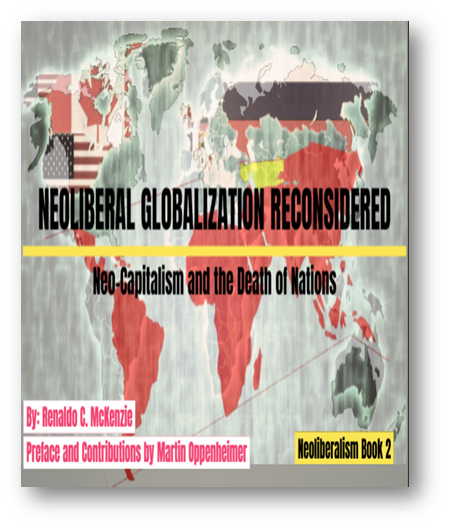In my upcoming book, Neoliberalism Book 2: Neoliberal Globalization Reconsidered, Unfair Competition and the Death of Nations, I explore the complexities of global resource economies and how they shape the fortunes of smaller nations, particularly those in the Caribbean. One striking example is Guyana, a country that found oil a few years ago. This discovery ignited hope throughout the region that Guyana’s economic trajectory would shift dramatically, propelling it toward prosperity. Many believed that oil wealth would be a game-changer, driving development, reducing poverty, and creating opportunities for local citizens.
However, the reality has been sobering. Despite its oil wealth, Guyana faces a situation where the benefits of this resource largely flow out of the country. Guyana retains a mere 12% of the revenue, with 78% going to U.S. companies to cover extraction and operational costs. This raises questions about the fairness of such agreements and whether this is another instance of economic exploitation that mirrors historical resource extractions in other Caribbean nations.
Jamaica’s experience with bauxite in 1957 is an illustrative cautionary tale. At the time, the discovery of bauxite—the primary ore used to produce aluminum—was hailed as a potential economic savior. It was thought that this newfound resource would allow Jamaica to secure a more competitive position in the global economy. However, over time, Jamaica found itself in a familiar bind: the costs of extracting and processing the resource, combined with inequitable revenue-sharing agreements, meant that the country ultimately paid more than it received. Instead of reaping the full benefits of its natural wealth, Jamaica was left grappling with environmental degradation and an economy that remained dependent on foreign powers.
Now, with the recent discovery of oil in Jamaica, there is concern that history may repeat itself. Will Jamaica’s oil experience mirror that of bauxite, where the nation had high hopes of economic transformation but ended up with a resource burdened by foreign exploitation and minimal returns? The dynamics of global capitalism, where larger, more powerful countries and corporations dictate the terms of resource extraction, create an uneven playing field for nations like Guyana and Jamaica. It is an unfair competition, one where smaller nations are at the mercy of multinational corporations that prioritize profits over equitable partnerships.
As I discuss in my book, the current global economic system, driven by neoliberal principles, often reinforces these imbalances. Developing countries are pressured into signing agreements that favor foreign companies because they lack the bargaining power or technological capacity to exploit their own resources independently. This results in a system where nations with abundant natural resources remain underdeveloped and economically dependent, despite their potential wealth.
The challenge for countries like Guyana and Jamaica is to reconsider the terms of engagement with foreign entities and push for agreements that ensure a fairer distribution of profits. This would require regional cooperation, stronger governance, and perhaps a rethinking of the neoliberal framework that has so far dominated global trade and resource extraction.
As these nations look toward the future, the question remains: can they break free from the patterns of the past, or will the discovery of oil follow the same path as bauxite—a path marked by hope, exploitation, and unfulfilled promises?
Neoliberal Globalization Reconsidered by Renaldo McKenzie and co-authored by Prof. Emeritus Dr. Martin Oppenheimer, will be available shortly via https://store.theneoliberal.com and also via our partners at IngramSpark, Amazon, Barnes and Noble etc.
Neoliberal Globalization Reconsidered is book 2 of the Neoliberalism Book series. Book 1 was release in 2021 and is available in all formats worldwide and via https://store.theneoliberal.com and in Audible via: https://www.audible.com/pd/B099LFCD79/?source_code=AUDFPWS0223189MWT-BK-ACX0-267926&ref=acx_bty_BK_ACX0_267926_rh_us
Check out our store at https://store.theneoliberal.com and also visit us at https://renaldocmckenzie.com.
The Neoliberal Round YouTube Channel is now over 11000 subscribers and over 75000 views. We continue to grow and develop here at The Neoliberal Corporation, a Think Tank, Publishing, digital media, IT, research and education support company with web design packages and now we have added Ads and marketing opportunities for those who want to advertise with us and share their content on our streams. Send us an email at [email protected] or [email protected].
The Neoliberal Journals is a publication of The Neoliberal Corporation.
visit us at The Neoliberal Post at https://renaldocmckenzie.com
Check out book 1 in The Neoliberalism Book Series:
Follow on Social Media: The Neoliberal Corporation or The Neoliberal and RenaldoMckenzie on Twitter. or Renaldo.mckenzie on Facebook and RevRenaldomckenzie on LinkedIn.
Visit us on Youtube: https://youtube.com/@renaldomckenzie
Visit us via any Podcast Stream: https://anchor.fm/theneoliberal
Donate to us at: https://ancjor.fm/theneoliberal/support or via our support page.



